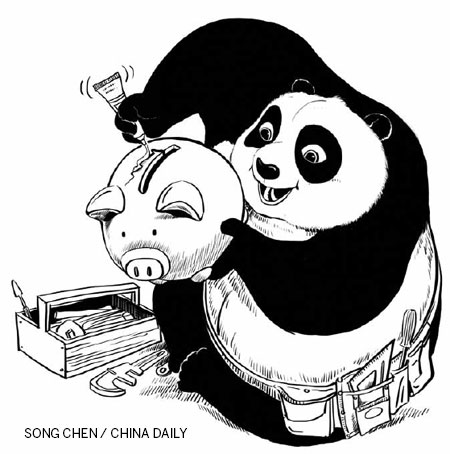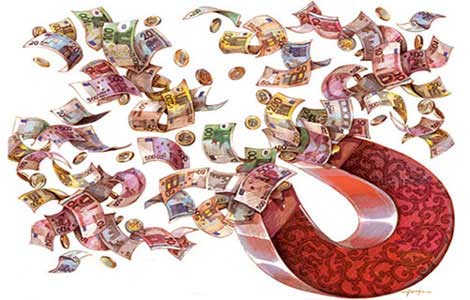Cons of deregulating finance
Updated: 2013-08-06 07:13
By Kevin P. Gallagher (China Daily)
|
||||||||

It is speculated that China is set to accelerate the deregulation of its financial system. For years, China has restricted the ability of its residents and foreign investors to pull and push their money in and out of the country.
While that may be illiberal, there was a sound reason for this restriction: Every emerging market that has scrapped these regulations has had a major financial crisis and subsequent trouble with growth.
The world can't afford that to happen in China. China is too big to fail.
This issue came to the fore last year when the People's Bank of China announced that it might "liberalize" its financial system in five to 10 years. The move was in stark contrast to a National Development and Reform Commission-World Bank report that put such a plan much further into the future.
That study cited the overwhelming evidence that shows, first, that dismantling cross-border financial regulations is not associated with growth and, second, that it tends to cause banking crises in economies with fledgling financial systems.
But now, Guan Tao, a State Administration of Foreign Exchange director-general has announced that "capital account convertibility" - as wonks call financial globalization - should happen in just a few years' time.
Indeed, China has already started raising the ceiling on the amount of foreign speculation in China.
Why rush this issue? Guan says this is about making the yuan a global currency. No doubt, in the long run it sure would be good to have more than US dollars on offer in the world economy. The US dollar is increasingly becoming a risky bet. Moreover, trading in the yuan would reduce exchange-rate risk for one of the world's largest trading countries (and all its trading partners). It would also reduce global risk by alleviating the world's over-reliance on the US dollar.
But China should not put the cart before the horse. To get where it wants to be and deserves to be, China will need to carefully reform its interest rate, exchange rate and financial regulatory regimes first.
Managing these reforms successfully will be close to impossible to achieve with a deregulated capital account. Financial stability is essential for China to move on with necessary reforms and maintain growth - as well as to maintain political stability.
The PBOC has kept interest rates low to provide cheaper loans for industry. This has been very beneficial, playing a key role in China's industrial policy that spawned the world's manufacturing export powerhouse. However, at this point China's investment rates are too high and China needs to consume more. Low rates moved households to over-invest in real estate, and have caused a real estate bubble in the country.
If China deregulated cross-border financial regulations before reforming its interest rate policy, there could be an enormous capital flight out of China. Low interest rates in China, juxtaposed with higher rates available abroad, would provide an attractive rate of return for many wealthy Chinese. While China has taken small steps in interest rate reform, it still has a long way to go.
Capital flight would also jeopardize China's exchange rate reform, which has deepened over the past two years. Exchange rate reform has made the yuan appreciate significantly, with estimates of yuan appreciation now at 35-50 percent.
Capital flight could cause a major depreciation of the yuan, which, in turn, could hurt consumers by further weakening their purchasing power, and stall reform.
China will also need to continue financial regulatory reform. The country's big banks are still indirectly responsible for large amounts of non-performing loans and are increasingly intertwined with a shadow banking system that is not properly regulated.
These banks need serious reform - or they will not be able to compete with international financial companies on liberalization.
The global record is clear: When Latin America prematurely opened its doors to foreign finance in the 1990s domestic banks got wiped out. Next, the new dominant players in the market - foreign banks - didn't lend to domestic enterprises with innovative new ideas. That undermined growth and economic transformation. The result has been anemic investment rates, de-industrialization and very little inclusive growth.
The International Monetary Fund's own (and other) studies show that capital flows are susceptible to massive surges and sudden stops. These trends have only intensified since the global financial crisis.
For a while, there was a surge in capital flows into emerging markets because of low interest rates in the industrialized world, which made things look good. But now that the US Federal Reserve has hinted that its bond buying programs would slow down, capital is fleeing from emerging market economies.
But even before that change in trend occurred, things were more bubbly than rosy. During the 2009-2013 period, when capital flowed in, exchange rates appreciated. That hurt export prospects and created asset bubbles. Now that exchange rates are falling, all those loans from the credit bubble are more expensive because they are denominated in US dollars.
China's ambitions aside, the fundamental economic lesson is clear: Regulating capital flows is essential for the exchange rate to fluctuate relative to economic fundamentals - rather than the irrational whims of speculative finance.
Indeed, there is now a consensus among economists and international financial institutions that capital account liberalization is not associated with economic growth in emerging markets, and that it causes banking crises (especially in countries with fixed exchange rates).
Such evidence has even prompted the IMF - the very institution that once saw rapid capital account liberalization as top priority - to change its tune. It now officially recommends the cautious sequencing of capital account liberalization.
China should remember with pride that it was not as severely hit by the financial crises of the 1980s and 1990s in Latin America and East Asia. These were crises where capital account liberalization played a big role. Large countries such as Indonesia were set back by as much as a decade. Why did China not suffer as much? Because it prudently regulated cross-border capital flows.
If China does not proceed with great caution now, few countries can weather a financial crisis that hits China. Across the world, we are reliant on China for trade, investment and finance. Simply put, China is too big to fail.
Thus, it is in the interests of the US and the rest of the world to urge China not to deregulate its financial system - but most of all, it is in China's own interest.
The author is a professor of international relations at Boston University and a regular contributor to The Globalist.
The Globalist
(China Daily USA 08/06/2013 page12)

 First taste of test-tube burger close to meat
First taste of test-tube burger close to meat
 Govt urged to take care of parents who lose child
Govt urged to take care of parents who lose child
 1 dead, dozens injured in Urumqi bus fire
1 dead, dozens injured in Urumqi bus fire
 Lei Feng's African brother
Lei Feng's African brother
 EU SMEs target niche markets in China
EU SMEs target niche markets in China
 British couple caring for special children
British couple caring for special children
 Fly for adventure at US air show
Fly for adventure at US air show
 Kobe Byrant meets fans in Shenzhen
Kobe Byrant meets fans in Shenzhen
Most Viewed
Editor's Picks

|

|

|

|

|

|
Today's Top News
Brunei bans tainted Fonterra dairy products
7 arrested for polluting S China river
Dialogue defuses EU, China solar case
Drifting left, Asian American voters still back John Liu
Beijing sincere on S China Sea Code of Conduct
Washington Post sold to Amazon's founder
Fonterra says sorry for 'anxiety'
Obesity rate on the increase
US Weekly

|

|





